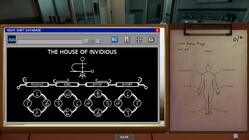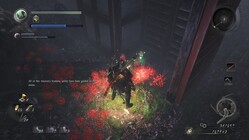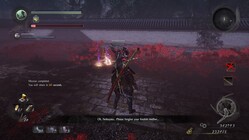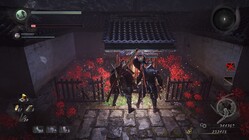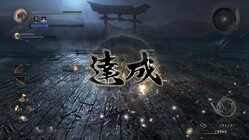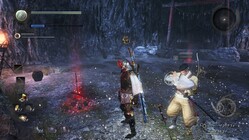Sakeru Gum series さけるグミ 1-11 complete (Eng SUB) #jp
https://yewtu.be/watch?v=sZsJyCyGBSI
Can't forget ながい ("nagai") = long
I can make out a few words in the audio but not the whole sentence. Also Chie-chan writes the following on the parcel after "Long Man" arrives.
少し お時間 あります か
sukoshi ojikan arimasu ka?
[little bit] [o = prefix][hour interval] [to be] [ka = question indicator]?
Tome the blacksmith girl of #nioh is the NPC I interact with the most (as the case for every player). She sometimes says something that is subtitled as,
"What sort of swords do they have in your land?"
The protagonist William is nicknamed Anjin by most Japanese NPCs. In the audio, "Anjin" can be heard in the beginning of the sentence.
"anjin no kuni ni wa don'na katana ga aru no"
- anjin no kuni = Anjin's country
- ni = from
- wa
- don'na = what kind, what sort, what
- katana ga
- aru = to be, to exist
- no = question indicator (feminine)
按針の国にはどんな刀が有るの
#jp
Came across a photoblog on the #fediverse
https://fedibird.com/@aesthetic/111751252130129245
https://llxyo.github.io/photolog/
凪のあすから 聖地巡礼
熊野市新鹿
"nagi no asu kara" "pilgrimage"
"bear plains city Atashika"
聖地巡礼 this scary block of kanji means "pilgrimage" but colloquially means "(noun) visiting real life locations used in anime or manga".
#jp #misc
達成 (translated as "mission complete") appears when the player completes a mission in Nioh.
(The game is about an English sailor named William whose guardian spirit was kidnapped. He travels to Japan to rescue her.)
I bought the game for myself and friend during a winter sale. We've been playing jolly co-op this weekend. Also I asked a chatbot about displaying kanji with furigana and it gave me this example.
漢字注音です。
#jp #nioh
https://yewtu.be/watch?v=zKnE98Wk2lM&t=2m29s
(Ah ha ha) sugoi nioi ga suru na?
すごい 匂い が する な ?
[cool] [scent] [ga = subject of verb] [to do] [right?]
https://8020japanese.com/particle-ga/#what-is-ga
"(WOW!)
"Furanku, kona kore yo no mono omoenai!"
フランク、こら これ 世 の もの 思えない
Frank, [hey] [this] [world's] [thing] [seems not]
"What's wrong, Safari Man? What's wrong?"
"Moshikashitara... O CHIN-CHIN DA."
若しかしたら… O CHIN-CHIN だ
"FURANKU, O CHIN-CHIN DA! AAH!"
"moshikashitara" seems to be a variation of "moshikashite":
-tara = (perhaps) by any chance
https://jisho.org/search/moshikashitara
-te = (perhaps) if I'm not mistaken
https://jisho.org/search/moshikashite
https://yewtu.be/watch?v=U4_6KIF4ZUs
I also found on jisho.
申し兼ねる (moushikaneru) = "difficult to say"
#jp
In the Japanese dub of Mistral's introduction, she says:
りべりア 内戦 で
'"ri be ri a" naisen de'
[Liberia "inside war" in]
伝説 と なった 白人 少年 兵
'densetsu to natta hakujin shounen hei'
[legend rumor (causal relationship) becomes white human boy soldier]
"In the Liberian civil war, a white boy soldier became a legend."
- 内戦 (naisen) = civil war
- 内 = inside
- 戦 = war
- 伝説 (densetsu) = legend, folklore
- 伝 = legend
- 説 = theory, view, rumor
- 兵 (hei) = soldier
When I tried identifying "naisen", a wrong kanji I had stumbled upon was 戟 (weapon) which is only different by the top markings on the first radical.
The Japanese dub is a lot different, less poetic, than her line in the English dub.
Liberian but white as snow. A natural-born killer even as a child.
https://yewtu.be/watch?v=lZIV0VJTRcU
#jp #metalgear
I remember seeing promotional videos for Metal Gear Rising that showcase the bosses in the game, but I can't find those videos anymore. The top results are now YouTubers who recorded the cutscenes.
I was curious about what Mistral says in her Japanese dub. Thanks to the subtitles, I can piece it together.
https://yewtu.be/watch?v=g3SiJkfMv9w&t=27m14s
私 は ミストラル
'watashi wa "mi su to ra ru"'
I am Mistral
フランス の 冷 たい 突風
'"fu ra n su" no tsume ta i toppu'
France's cold piercing wind.
冷 (tsume) = cold
突風 (toppu):
突 = stab, pierce
風 = wind, air
Based on how online tools acted when I queried these characters "toppu" appears to be a single word represented by two kanji. Otherwise, the kanji individually have very different pronunciations.
Side note: I like Mistral's English dub more than her Japanese dub. In the former, I can hear her combined French-African accent, not so much for the latter. In Japanese, she also sounds a lot like Ragyo from Kill la Kill, not as unique as her English dub.
#jp #metalgear
Today I learned three new Kanji from a yewtube video.
https://yewtu.be/watch?v=7-IkUdg9YWM
人 (jin) = human
黒 (koku) = black
白 (haku) = white
I haven't delved into Katakana yet, but the wallpaper says
二がス イン パりス
#jp
今日 は なに しよう かな
"kyou ha nani shiyou ka na?"
(What should we do today?)
I learned this phrase from the disgusting French cartoon Peepodoo.
In the episode "Barubaru-chan", Peepodoo plays an eponymous video game, dating a fictional-within-fiction character Barubaru-chan. She represents an anime girl but appears as an animated photograph of a woman.
The pronunciation sounds like
"kyou wa nani ..."
However, the topic marker in Japanese is pronounced "wa" but spelled は.
#jp
Learning Japanese with Pink Guy.
https://yewtu.be/watch?v=4qKJS-8bzoA
"Ohayoo gozaimasu.
おはよう ございます。
(Good morning.)
"Kyou wa
今日 わ
"Ramen (w)o tsukurimasu."
らめん を つくります。
(Today I'm making ramen.)
"Tanoshi desu ne."
たのしい です ね。
(Fun, right?)
"Jaa. Hajimemashou."
じゃあ。はじめましょう。
(Well then, let's start.)
Also trying out fcitx5 + anthy to type Japanese.
https://wiki.archlinux.org/title/Fcitx5#Integration
#jp
My very own table for Hiragana.
| a | i | u | e | o | |
|---|---|---|---|---|---|
| ∅ | あ | い | う | え | お |
| k | か | き | く | け | こ |
| s | さ | し | す | せ | そ |
| t | た | ち | つ | て | と |
| n | な | に | ぬ | ね | の |
| h | は | ひ | ふ | へ | ほ |
| m | ま | み | む | め | も |
| y | や | ゆ | よ | ||
| r | ら | り | る | れ | ろ |
| w | わ | ゐ | ゑ | を |
(Dakuten and handakuten added to corresponding kana: k-related syllables become 'g', and so on.)
| ゛ | ゜ | |
| k | g | |
| s | z | |
| t | d | |
| h | b | p |
#jp
I told myself to learn Japanese even though it is one of the hardest languages to learn coming from English.
[Obligatory complaint about Kanji.]
I managed to get a hold of Genki. In the Kanji section, it says:
Kanji are Chinese characters which were introduced to Japan more than 1500 years ago when the Japanese language did not have a writing system.
This is a statement I took with skepticism since the erasure of history and culture occured throughout the ancient times. But this would mean the Japanese language did not have a writing system prior to 500 CE.
I had found a website that I probably wouldn't be able to find through a search engine in the future. (Very old looking, goes against established academic canon, will probably be out-competed by newer search-optimized websites).
https://www.archaeometry.org/pre-kanji.htm
Regardless, there is no way around Kanji.
日 = "day" or "sun"
I would have never guessed as it looked more like a drawer.
#jp
